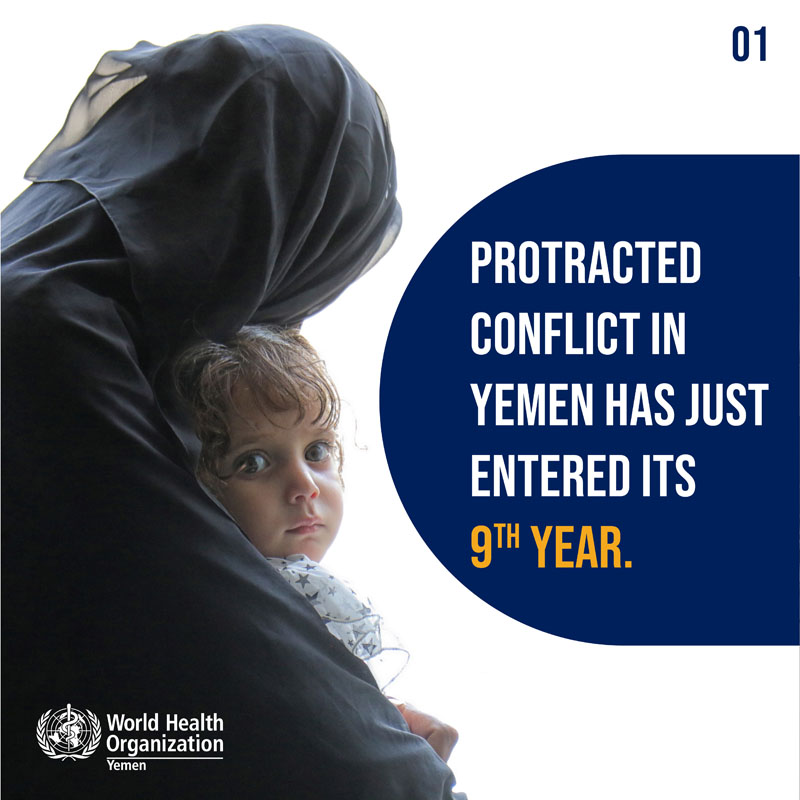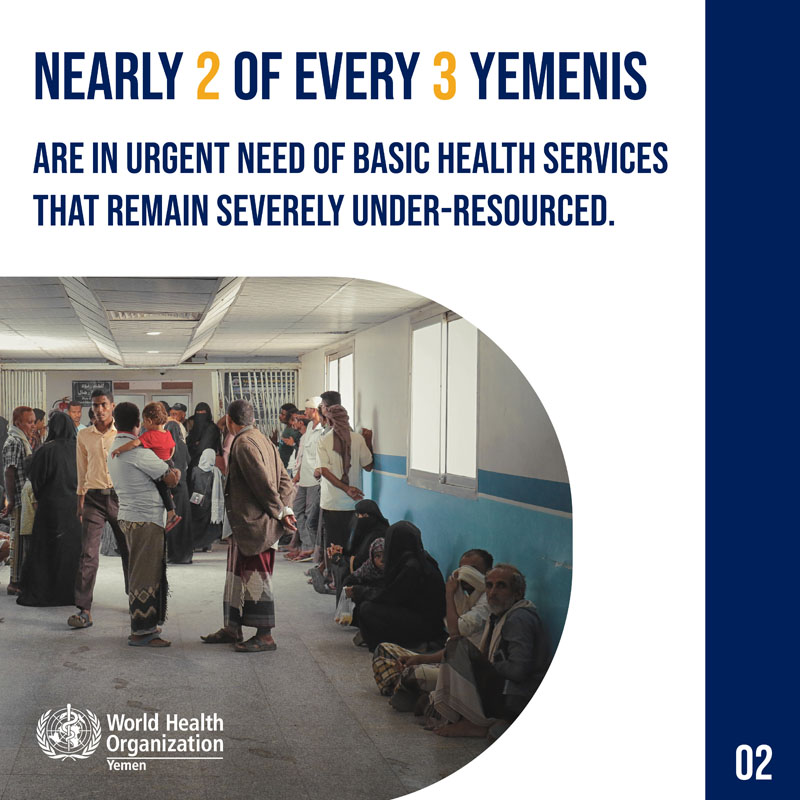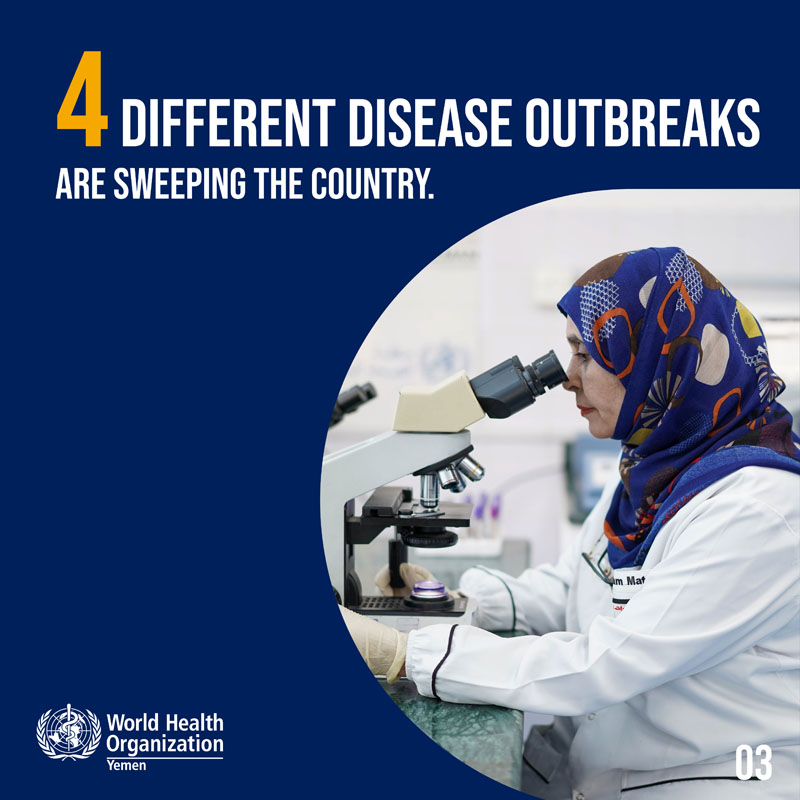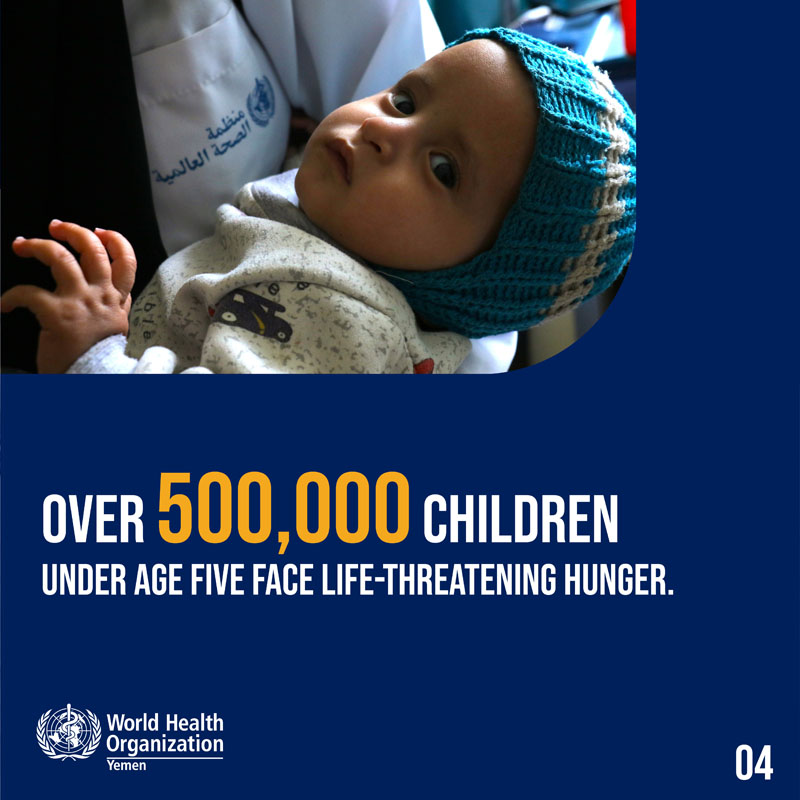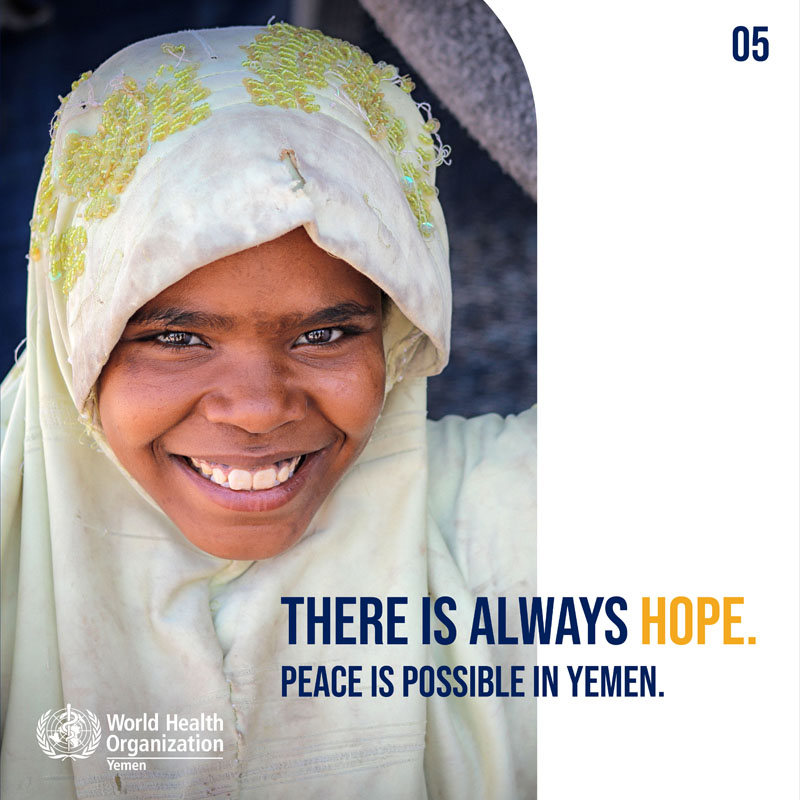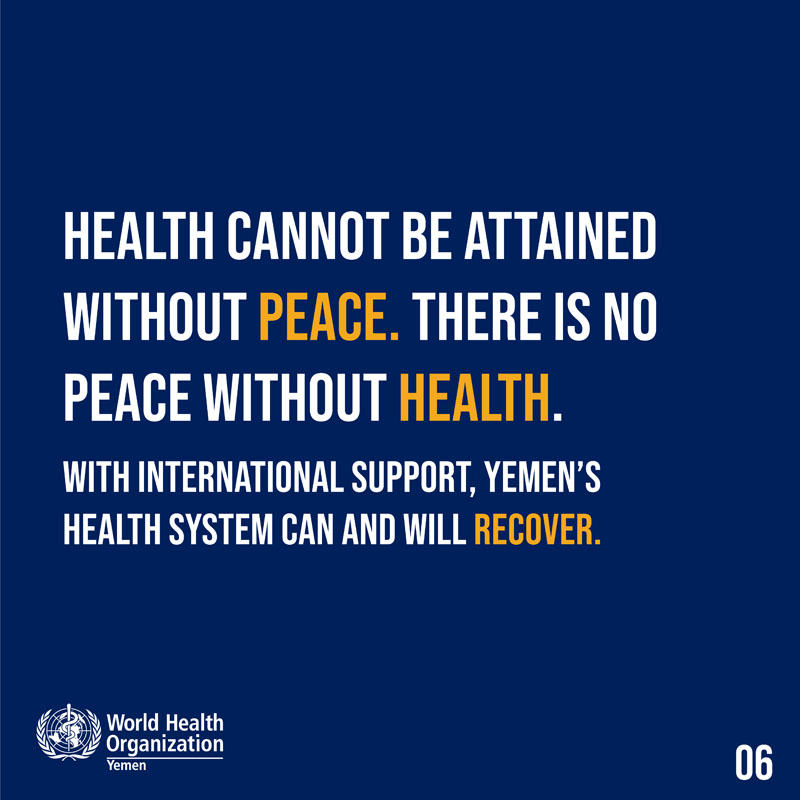Eight years and counting: achieving peace through health in conflict-ravaged Yemen
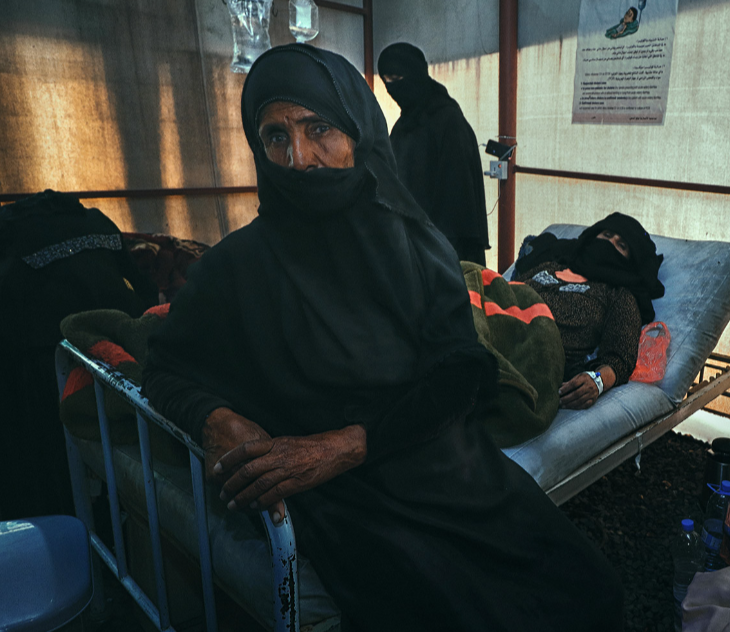
30 March 2023 – The conflict in Yemen has become a largely forgotten and neglected humanitarian crisis in which two-thirds of the population – more than 20 million people – are in present need of urgent health assistance. But as this protracted conflict now enters its ninth year, there is renewed hope for eventual peace and health, for all Yemenis.
“Arabia Felix”, or “Happy Yemen” – as this beautiful and once-prospering country was called in ancient Roman times – is deeply suffering and impoverished today.
Since March 2014, long years of conflict have driven Yemen into a dark abyss of human deprivation and despair. Multiple life-threatening health risks, and a severely crippled and overwhelmed health system, have contributed to making Yemen home to one of the world’s most protracted and dire humanitarian crises.
Currently, only 54% of health facilities are functioning, while 46% are closed or only partially operating. Facilities that are still open are badly overstretched and struggling to provide even most basic services, due to shortages of staff, electricity, medicines, supplies, and equipment. Most health workers are receiving reduced payments if any, compared to previous years – resulting in further deterioration of essential services.
WHO advocacy to empower female health workers in Yemen

28 March 2023, Aden | Sana’a – In a context of increasing restrictions on women in Yemen, WHO is advocating for gender equality and to address gender-based violence. Through the Emergency Human Capital Project (EHCP) supported by the World Bank, WHO is negotiating and succeeding in increasing the participation of female health workers in capacity-building and field work activities.
“Empowering female health workers has immediate benefits for the women involved, as they are given learning opportunities and financial allowances. It also contributes to Yemeni women more broadly, having better access to essential health services”.
In 2022, reports of restrictions on the movement of women in Yemen started to be increasingly reported. For example, in many governorates, women should not travel without a male escort (e.g. father, brother or husband) (known as mahram). This meant that female health workers could not participate in multi-day WHO training activities far from their place of residence. In some cases, social norms restrict women from being treated or physically examined by male doctors. One female health worker explained, “The lack of female health workers in Yemen has exacerbated the humanitarian emergency, as it forces Yemeni women to go without the care they need.”
The impact of such restrictions is reflected in estimates of maternal mortality in Yemen. Before the humanitarian emergency, in 2015, Yemen was estimated to have 164 maternal deaths per 100 000 live births. Last month, WHO, the World Bank, UNICEF, UNFPA and UNDESA released new estimates indicating Yemen’s maternal mortality ratio had increased to 183 as of 2020.
In response to this challenging situation, WHO conducted a rapid gender analysis assessment of EHCP activities, which showed that women account for only around 18% of participants in EHCP training, workshops, field visits and other activities linked to per diem payments.

WHO communicated these findings by official letter to the authorities in Aden and Sana’a and requested support to achieve 50% female participation in all World-Bank-funded activities going forward. The Ministry of Public Health and Population replied to WHO the next day in concurrence and nominated a focal point for gender in Aden.
In parallel, a series of consultative meetings have been held with the Ministry's gender-based violence (GBV) focal point in Aden and a joint operational plan was developed to establish protection units in EHCP hospitals. A grievance redress mechanism is also in place in all EHCP hospitals to report any case related to violence, sexual exploitation or harassment. In addition, WHO has conducted orientation sessions to increase awareness and staff of the Organization have consulted and sought feedback from 500 female health workers on issues related to gender-based violence.
As part of these efforts, WHO also provided survivor-centred care and psychological first aid training to 129 nurses, midwives and doctors towards improving the services available to people experiencing gender-based violence. One of the participants provided feedback that “since the eruption of war in Yemen there are increased cases of women experiencing sexual violence and GBV, making prevention and response efforts even more important. One doctor added “I appreciate this initiative by WHO on making a commitment to supporting health staff in addressing GBV as an urgent public health matter and ensuring that those experiencing violence receive high-quality care.”
Related links
Women at the forefront of the COVID-19 response in Yemen, 31 August 2022
Eight years of prolonged conflict in Yemen leave over 20 million people in need of urgent health assistance
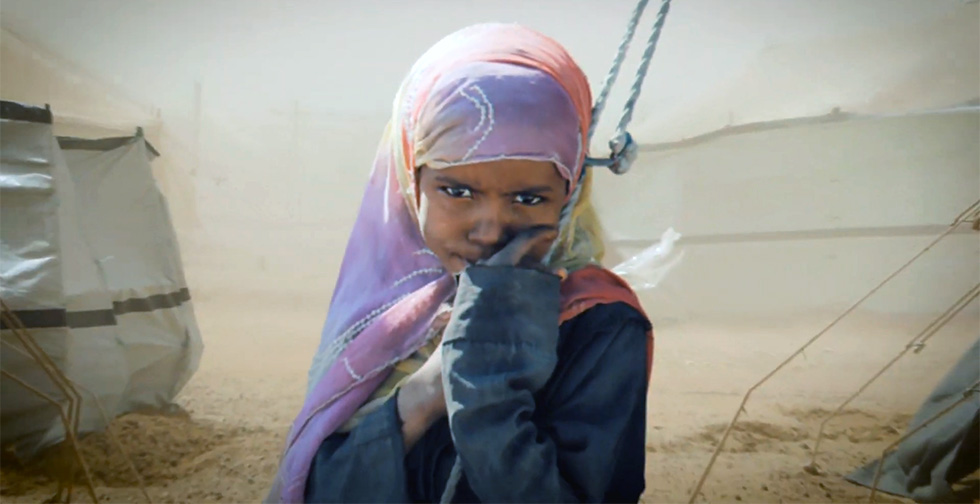
Cairo, 25 March 2023 – With 8 years of protracted conflict and humanitarian crisis, over two thirds of Yemen’s population – 21.6 million people – are in acute need of humanitarian assistance, including over 20 million people requiring urgent health assistance.
The country’s health system continues to fall short of meeting the population’s needs. Only 54% of health facilities are fully functioning, while 46% are only partially operating or entirely out of service.
“The world cannot continue to ignore Yemen. We call on expanded and sustained international support to health systems and the brave frontline health workers. I witnessed firsthand the suffering, illness and death of innocent civilians caught up in this crisis when I visited the country. Our ultimate goal is to build safer and healthier future for all Yemenis. Yet health cannot be attained without peace. Peace is possible and it is the only solution, but it needs everyone’s commitment,” says Dr Ahmed Al-Mandhari, WHO Regional Director for the Eastern Mediterranean.
Overstretched health facilities are barely providing the most basic services as they struggle with lack of staff, funds, electricity, medicines, supplies and medical equipment.
Health workers are paid less than in previous years due to the severe funding shortfall, leaving health facilities facing a continuous decline in health capacities. Yemeni health workers have been serving selflessly. Millions of children and families depend on them for hope, healing and survival.
The war – with its distressing stories of the destruction of homes, loss of lives, youth disabled, displacement and economic deterioration, compounded by the COVID-19 pandemic, cholera and other outbreaks, and recurrent natural disasters – has taken an enormous toll on people's resilience and their mental health.
The World Health Organization (WHO), together with its Health Cluster partners in Yemen, is appealing for US$ 392 million to reach 12.9 million people with essential health assistance in 2023.
WHO’s longstanding response, with the support of donors and partners, to the health crisis in Yemen has been instrumental in saving lives and averting the imminent collapse of the health system through an integrated approach to sustaining priority health interventions.
These include: supporting over 4500 health care facilities and national laboratories with supplies, medicines, fuel, water, sanitation and hygiene services; coordinating the national Health Cluster; keeping therapeutic feeding centres operational; and strengthening disease surveillance to respond to all infectious disease outbreaks.
Moreover, WHO has been able to improve the delivery of mental health and psychosocial support services. Since 2021, more than 3500 health care staff, first responders, frontline workers, schoolteachers and child protection and gender-based violence case managers have been trained in mental health and psychosocial support.
WHO remains fully committed to supporting the health and welfare of the Yemeni people under its regional vision of health for all by all, and calls for solidarity and action. During a period of multiple crises and pressing needs across the Region and the planet, WHO appeals for greater attention to the continued plight of the people of Yemen and calls for more assistance to address one of the world’s most neglected crisis.
Media contacts:
Inas Hamam
Emergency Communication Manager
WHO Regional Offic for the Eastern Mediterranean
Kevin Cook
Communication Advisor
WHO Yemen
Bravery and resilience in the face of adversity
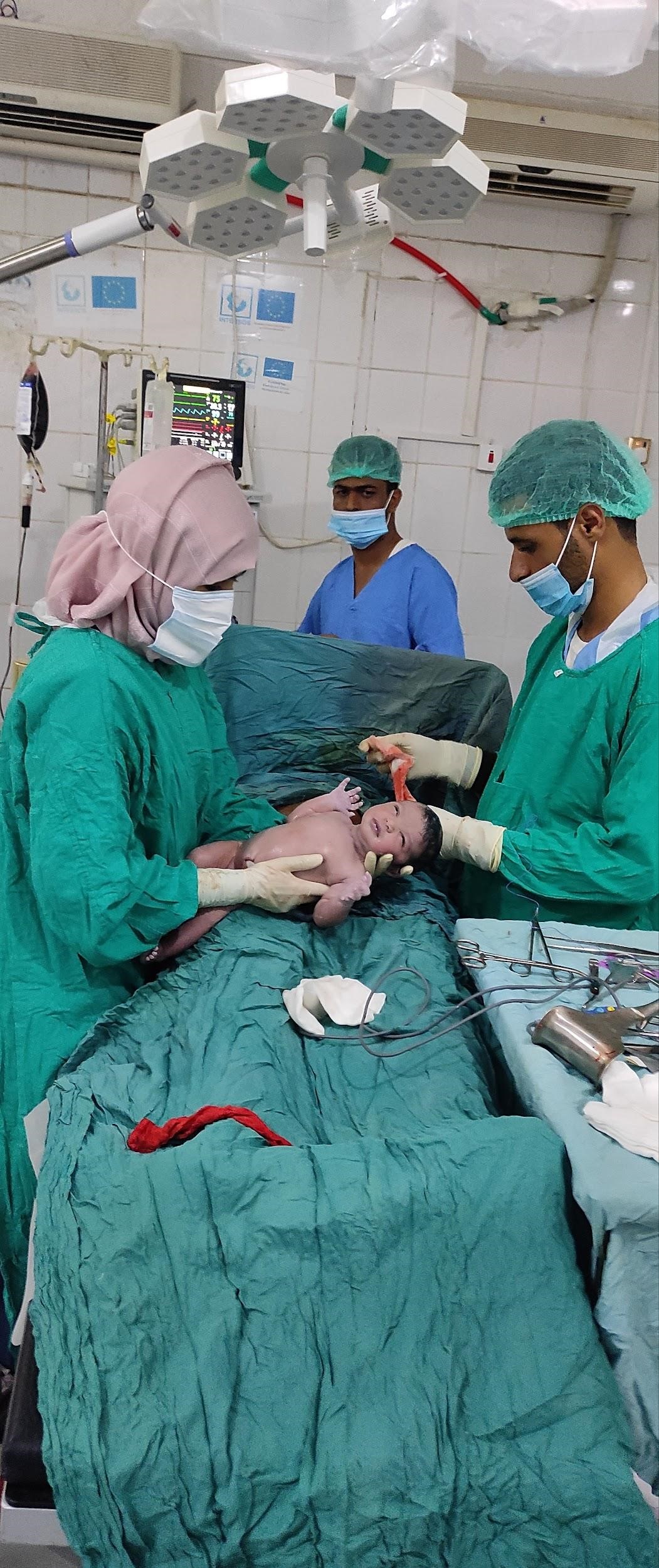 The birth of a baby girl Houria in Qafl Shammar Hospital in Hajjah governorate while she is healthy and weighs 3 kg. Credit: INTERSOS23 March 2023 – For many Yemeni women who are pregnant, breastfeeding and displaced by conflict, hard-to-reach and struggling hospitals are still working to save their lives, and deliver new ones.
The birth of a baby girl Houria in Qafl Shammar Hospital in Hajjah governorate while she is healthy and weighs 3 kg. Credit: INTERSOS23 March 2023 – For many Yemeni women who are pregnant, breastfeeding and displaced by conflict, hard-to-reach and struggling hospitals are still working to save their lives, and deliver new ones.
When Horia, 37, began experiencing life-threatening complications due to a high-risk pregnancy, she learned that the one health facility near to her village was inadequately staffed and equipped to help her.
Horia’s family urged her to let them take her to the ER of Qafl Shamer hospital in the Qafl Shamer district of Hajjah governorate.
Horia made it to the hospital, she arrived suffering increasingly strong and distressing labour pains.
Upon arrival Horia was immediately attended to by a specialized doctor who is supported by the project. He performed a rapid diagnosis and emergency C-section that delivered a healthy 3 kg baby girl into Horia’s waiting arms.
“Our lives are so difficult now, and the support I received here meant so much to us,” said Horia during a follow-up visit to the hospital.
Qafl Al Sahmer hospital is supported to provide emergency and secondary health care services to some of the most vulnerable, conflict-affected and internally displaced people (IDPs) in Hajja governorate, including supporting 34 emergency staff with incentive payments.
Eight years of armed conflict in Yemen has devastated the country’s health care system to the point that most vulnerable communities, including Horia, lack access to even the most basic and essential services. In Qafl Shamer district of Hajjah governorate where Horia and her family reside, there are nearly 566 000 IDPs, while just over half of all health facilities across the governorate either closed or only partially functioning. For many or most IDPs, living conditions are dire, at best.
In partnership with INTERSOS, and with generous funding from the Government of Germany, WHO is leading the health response in Yemen to protect essential health services for the most vulnerable and their communities and responding to the health consequences of the conflict and severe economic downturn.
Specialized health interventions managed by WHO with INTERSOS aim to support women like Horia, those facing increased risk of death and severe complications during childbirth due to a lack of access to essential health care.
WHO’s partnership with INTERSOS dates to 2018, and is continuing to strengthen essential health services while improving their availability to most vulnerable persons, through the Minimum Services Package (MSP), a health service delivery mechanism which focuses on 8 priority health care services, targeting health facilities at the district level.
To date, the health of over 13 500 Yemeni people has been supported through WHO’s partnership with INTERSOS, including 3200 vulnerable and at-risk women and around 8000 children.


